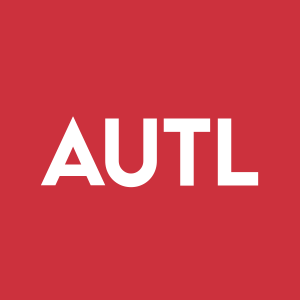Autolus Therapeutics to Present Clinical Data Updates at the American Society of Hematology (ASH) Annual Meeting 2025
Rhea-AI Summary
Autolus (Nasdaq: AUTL) announced five abstracts for presentation at the ASH Annual Meeting (Dec 6-9, 2025) detailing clinical updates for obe-cel (obecabtagene autoleucel) across autoimmune and hematologic indications.
Key points: Phase I CARLYSLE data in severe refractory SLE show pronounced CAR T expansion, deep B-cell depletion and clinical benefit; pediatric CATULUS trial reports ORR 95% and ~90% ongoing remissions at cutoff; drug-product phenotypes (higher Tcm) correlated with improved OS; Month 3 CAR T persistence predicts longer EFS/OS; commercially available reagents can track obe-cel but CD19-based reagents are unsuitable.
Positive
- Pediatric ORR of 95% in Phase Ib/II CATULUS
- ~90% of pediatric responders with ongoing remission at cutoff
- Higher drug-product Tcm percentage independently predicted improved OS
- Month 3 CAR T-cell persistence associated with longer EFS and OS
- Feasible CAR T monitoring using commercially available G4S-targeting reagents
Negative
- CARLYSLE results are initial Phase I data requiring longer follow-up
- Leukapheresis phenotype weakly correlates with drug-product phenotype
- CD25+ HLA-DR+ CD4+ cells in leukapheresis predicted worse outcomes
- CD19-based detection reagents are unsuitable for tracking obe-cel
News Market Reaction 2 Alerts
On the day this news was published, AUTL gained 0.65%, reflecting a mild positive market reaction. Our momentum scanner triggered 2 alerts that day, indicating moderate trading interest and price volatility. This price movement added approximately $3M to the company's valuation, bringing the market cap to $434M at that time.
Data tracked by StockTitan Argus on the day of publication.
LONDON and GAITHERSBURG, Md., Nov. 03, 2025 (GLOBE NEWSWIRE) -- Autolus Therapeutics plc (Nasdaq: AUTL), an early commercial-stage biopharmaceutical company developing, manufacturing and delivering next-generation programmed T cell therapies, announces the online publication of five abstracts submitted to the American Society of Hematology (ASH) Annual Meeting, to be held December 6-9, 2025, in Orlando, Florida.
“Data to be presented at the upcoming ASH Annual Meeting continue to underscore the potential for obe-cel to produce long-term outcomes in severe and difficult to treat patient populations in both hematological oncology and autoimmune indications,” said Dr. Christian Itin, Autolus Chief Executive Officer. “In addition to Autolus’ presentations, we look forward to the presentation of data from real-world experience of the ROCCA consortium evaluating CAR T therapy for relapsed/refractory adult ALL patients. We are encouraged with the real-world experience with obe-cel and believe it will support momentum for product uptake.”
Abstract 302 – Oral presentation
Title: Obecabtagene autoleucel (obe-cel), a CD19-targeting chimeric antigen receptor (CAR) T-cell therapy, in patients with severe, refractory systemic lupus erythematosus (SLE) in the Phase I CARLYSLE study: initial safety, preliminary efficacy, pharmacokinetics, and biomarker results
Session Name: Cellular Immunotherapies: Early Phase Clinical Trials and Toxicities: Emerging CAR-T Cell Therapies for Acute Leukemias and Autoimmune Diseases
Session Date and Time: December 8, 2025; 11:30 – 11:45am ET
Session Room: Orange County Convention Center; Valencia Room W415D
Publication Number: 815
Presenting Author: Claire Roddie, MD, PhD, FRCPath, Associate Professor Haematology and Honorary Consultant Haematologist, Cancer Institute, University College London (UCL)
Summary: Initial findings from the ongoing CARLYSLE study of obe-cel in severe, refractory SLE are promising and suggest a favorable safety profile with obe-cel treatment, with pronounced CAR T-cell expansion, deep B cell depletion and observed clinical benefit. The B-cell reconstitution profiles suggest that obe-cel may induce a reset of pathologic autoimmunity. Updated Phase 1 data with longer follow-up, and data in patients who received 100×106 CAR T-cells will be presented.
Abstract 4429 – Oral presentation
Title: Impact of chimeric antigen receptor (CAR) product cell phenotypes on clinical outcomes following treatment with obecabtagene autoleucel (obe-cel)
Session Name: Acute Lymphoblastic Leukemias: Biomarkers, Molecular Markers, and Measurable Residual Disease in Diagnosis and Prognosis: Prognostic Genetic and Therapeutic Response Factors in Adult and Pediatric B-ALL
Session Date and Time: December 6, 2025; 10:00 – 10:15am ET
Session Room: Orange County Convention Center; W224CDGH
Publication Number: 33
Presenting Author: Benjamin Simpson, Ph.D., Bioinformatics & Data Management Principal Scientist, Autolus Therapeutics
Summary: Clinical data show the potential for obe-cel to produce long-term outcomes. This analysis details certain product features potentially affecting clinical outcomes, including how drug product phenotypes correlate with treatment outcomes following infusion with obe-cel. A higher percentage of central memory cells (Tcm) in the drug product samples was an independent predictor of positive clinical outcomes, including overall survival (OS), following obe-cel infusion. While the T-cell phenotype composition in the leukapheresis product (LP) was weakly correlated with that in the drug product, CD25+ HLADR+ CD4+ cells in the LP independently predicted less favorable clinical outcomes. However, other factors (e.g. tumor characteristics) are also likely to affect outcomes; therefore, further investigations are needed to better understand and predict favorable clinical outcomes, and to potentially guide studies of additional cell manipulations during CAR T-cell manufacturing.
Abstract 740 – Poster presentation
Title: Treatment of pediatric patients (pts) with relapsed/refractory B-cell acute lymphoblastic leukemia (R/R B-ALL) with obecabtagene autoleucel (obe-cel), a CD19-directed chimeric antigen receptor (CAR) T-cell therapy: preliminary findings from the Phase Ib/II CATULUS trial
Session Name: Acute Lymphoblastic Leukemias: Therapies Excluding Allogeneic Transplantation: Poster II
Session Date and Time: December 7, 2025; 6:00 – 8:00pm ET
Session Room: Orange County Convention Center; West Halls B3-B4
Publication Number: 3337
Presenting Author: Sara Ghorashian, Consultant Haematologist at Great Ormand Street Hospital for Children (GOSH) and Honorary Associate Professor at UCL
Summary: CATULUS is a single-arm, open-label, multi-center study enrolling high-risk patients under age 18 with r/r B-ALL that is primary refractory, in high-risk first relapse, or in second or later relapse. The safety profile of obe-cel in pediatric patients was consistent with that previously reported in adults, with low rates of high-grade CRS and ICANS. ORR was high at
Abstract 4060 – Poster presentation
Title: Chimeric antigen receptor (CAR) T-cell persistence at Month 3 predicts clinical outcomes in adult patients with relapsed/refractory B-cell acute lymphoblastic leukemia (R/R B-ALL) treated with obecabtagene autoleucel (obe-cel)
Session Name: Acute Lymphoblastic Leukemias: Therapies Excluding Allogeneic Transplantation: Poster III
Session Date and Time: December 8, 2025; 6:00 – 8:00pm ET
Session Room: Orange County Convention Center; West Halls B3-B4
Publication Number: 5118
Presenting Author: Claire Roddie, MD, PhD, FRCPath, Associate Professor Haematology and Honorary Consultant Haematologist, Cancer Institute, University College London (UCL)
Summary: In patients who remained in remission beyond month 3 (M3), including those with deep MRD-negative remission and no post obe-cel SCT, ongoing CAR T-cell persistence at M3, measured by droplet digital PCR (ddPCR), was associated with longer event-free survival (EFS) and overall survival (OS) compared with loss of persistence. Persistence status at M3 may be a marker for predicting long-term outcomes following obe-cel treatment in patients with R/R B-ALL.
Abstract 4031 – Poster presentation
Title: Evaluation of commercially available chimeric antigen receptor (CAR) detection reagents for monitoring of CAR T-cell (CAR T) expansion and persistence in patients (pts) treated with obecabtagene autoleucel (obe-cel)
Session Name: Cellular Immunotherapies: Early Phase Clinical Trials and Toxicities: Poster I
Session Date and Time: December 6, 2025; 5:30 – 7:30pm ET
Session Room: Orange County Convention Center; West Halls B3-B4
Publication Number: 2367
Presenting Author: Rehan Hussain, Translational Medicine Senior Scientist
Summary: Measuring obe-cel expansion and persistence using flow cytometry (FC) is feasible with commercially available antibodies that directly target regions of the CAR construct, such as the G4S linker. These reagents show high correlation with anti-idiotype antibodies and provide a reliable method for tracking CAR expression in patients. Use of the G4S binder enabled tracking of CAR T expansion kinetics and phenotypic profiles in patients with different disease burdens. Reagents based on the CD19 protein, commonly used in other CAR T therapies, are unsuitable for obe-cel due to the unique features of the CAT19 binder, which limits effective detection.
About Autolus Therapeutics plc
Autolus Therapeutics plc (Nasdaq: AUTL) is an early commercial-stage biopharmaceutical company developing, manufacturing and delivering next-generation T cell therapies and candidates for the treatment of cancer and autoimmune disease. Using a broad suite of proprietary and modular T cell programming technologies, Autolus is engineering precisely targeted and controlled T cell therapies that are designed to better recognize target cells, break down their defense mechanisms and eliminate these cells. Autolus has a marketed therapy, AUCATZYL®, and a pipeline of product candidates in development for the treatment of hematological malignancies, solid tumors and autoimmune diseases. For more information, please visit www.autolus.com.
About AUCATZYL® (obe-cel, AUTO1)
AUCATZYL is a B-lymphocyte antigen CD19 (CD19) chimeric antigen receptor (CAR) T cell therapy designed to overcome the limitations in clinical activity and safety compared to current CD19 CAR T cell therapies. AUCATZYL is designed with a fast target binding off-rate to minimize excessive activation of the programmed T cells. AUCATZYL was approved by the FDA for the treatment of adult patients with relapsed or refractory B-cell precursor acute lymphoblastic leukemia on November 8, 2024, and was granted conditional marketing authorization by MHRA in the UK and EMA in the EU in 2025.
INDICATION
AUCATZYL® is a CD19-directed genetically modified autologous T cell immunotherapy indicated for the treatment of adult patients with relapsed or refractory B-cell precursor acute lymphoblastic leukemia (ALL).
IMPORTANT SAFETY INFORMATION
| WARNING: CYTOKINE RELEASE SYNDROME, NEUROLOGIC TOXICITIES, and SECONDARY HEMATOLOGICAL MALIGNANCIES |
|
|
|
WARNINGS AND PRECAUTIONS
Cytokine Release Syndrome (CRS)
Cytokine Release Syndrome (CRS) occurred following treatment with AUCATZYL. CRS was reported in
Cytokine Release Syndrome (CRS) occurred following treatment with AUCATZYL. CRS was reported in
Prior to administering AUCATZYL, ensure that healthcare providers have immediate access to medications and resuscitative equipment to manage CRS. During and following treatment with AUCATZYL, closely monitor patients for signs and symptoms of CRS daily for at least 7 days following each infusion. Continue to monitor patients for CRS for at least 2 weeks following each infusion with AUCATZYL. Counsel patients to seek immediate medical attention should signs or symptoms of CRS occur at any time. At the first sign of CRS, immediately evaluate the patient for hospitalization and institute treatment with supportive care based on severity and consider further management per current practice guidelines.
Neurologic Toxicities
Neurologic toxicities including Immune Effector Cell-associated Neurotoxicity Syndrome (ICANS), which were fatal or life-threatening, occurred following treatment with AUCATZYL. Neurologic toxicities were reported in
The median time to onset of neurologic toxicities was 10 days (range: 1 to 246 days) with a median duration of 13 days (range: 1 to 904 days). Fifty-five percent of patients (35/64) experienced neurologic toxicities after the first infusion but prior to the second infusion of AUCATZYL with a median time to onset of 6 days (range: 1 to 11 days). Among patients with neurologic toxicities, the most common symptoms (>
Immune Effector Cell-associated Neurotoxicity Syndrome (ICANS)
ICANS events occurred in
During and following AUCATZYL administration, closely monitor patients for signs and symptoms of Neurologic Toxicity/ICANS. Following treatment with AUCATZYL, monitor patients daily for at least 7 days. Continue to monitor patients for at least 2 weeks following treatment with AUCATZYL. Avoid driving for at least 2 weeks after each infusion. Counsel patients to seek medical attention should signs or symptoms of neurologic toxicity/ ICANS occur. At the first sign of Neurologic Toxicity/ICANS, immediately evaluate patients for hospitalization and institute treatment with supportive care based on severity and consider further management per current practice guidelines.
Prolonged Cytopenias
Patients may exhibit cytopenias including anemia, neutropenia, and thrombocytopenia for several weeks after treatment with lymphodepleting chemotherapy and AUCATZYL. In patients who were responders to AUCATZYL, Grade ≥ 3 cytopenias that persisted beyond Day 30 following AUCATZYL infusion were observed in
Infections
Severe, including life-threatening and fatal infections occurred in patients after AUCATZYL infusion. Non-COVID-19 infections of all grades occurred in
Grade 3 or higher febrile neutropenia was observed in
Viral reactivation, potentially severe or life-threatening, can occur in patients treated with drugs directed against B cells. There is no experience with manufacturing AUCATZYL for patients with a positive test for human immunodeficiency virus (HIV) or with active hepatitis B virus (HBV) or active hepatitis C virus (HCV). Perform screening for HBV, HCV and HIV in accordance with clinical guidelines before collection of cells for manufacturing.
Hypogammaglobulinemia
Hypogammaglobulinemia and B-cell aplasia can occur in patients after AUCATZYL infusion. Hypogammaglobulinemia was reported in
Immunoglobulin levels should be monitored after treatment with AUCATZYL and managed per institutional guidelines including infection precautions, antibiotic or antiviral prophylaxis, and immunoglobulin replacement.
The safety of immunization with live viral vaccines during or following treatment with AUCATZYL has not been studied. Vaccination with live viral vaccines is not recommended for at least 6 weeks prior to the start of lymphodepleting chemotherapy treatment, during AUCATZYL treatment, and until immune recovery following treatment with AUCATZYL.
Hemophagocytic Lymphohistiocytosis/Macrophage Activation Syndrome (HLH/MAS)
HLH/MAS including fatal and life-threatening reactions occurred after treatment with AUCATZYL. HLH/MAS was reported in
Hypersensitivity Reactions
Serious hypersensitivity reactions, including anaphylaxis, may occur due to dimethyl sulfoxide (DMSO), an excipient used in AUCATZYL. Observe patients for hypersensitivity reactions during and after AUCATZYL infusion.
Secondary Malignancies
Patients treated with AUCATZYL may develop secondary malignancies. T cell malignancies have occurred following treatment of hematologic malignancies with BCMA- and CD19-directed genetically modified autologous T cell immunotherapies. Mature T cell malignancies, including CAR-positive tumors, may present as soon as weeks following infusion, and may include fatal outcomes. Monitor lifelong for secondary malignancies. In the event that a secondary malignancy occurs, contact Autolus at 1-855-288-5227 for reporting and to obtain instructions on the collection of patient samples for testing.
Adverse Reactions
The safety of AUCATZYL was evaluated in the FELIX study in which 100 patients with relapsed or refractory B-cell acute lymphoblastic leukemia (B-ALL) received AUCATZYL at a median dose of 410 × 106 CD19 CAR-positive viable T cells (range: 10 to 480 × 106 CD19 CAR-positive viable T cells with
The most common serious adverse reactions of any Grade (incidence ≥
Please see full Prescribing Information, including BOXED WARNING and Medication Guide.
Forward-Looking Statements
This press release contains forward-looking statements within the meaning of the "safe harbor" provisions of the Private Securities Litigation Reform Act of 1995. Forward-looking statements are statements that are not historical facts, and in some cases can be identified by terms such as "may," "will," "could," "expects," "plans," "anticipates," and "believes." These statements include, but are not limited to, statements regarding the therapeutic potential and expected clinical benefits of obecabtagene autoleucel (obe-cel); the period during which the results of clinical studies or trials will become available; the timing or likelihood of regulatory filings and approvals for product candidates, along with regulatory developments in the US, EU, the UK and other foreign countries. Any forward-looking statements are based on management's current views and assumptions and involve risks and uncertainties that could cause actual results, performance, or events to differ materially from those expressed or implied in such statements. These risks and uncertainties include, but are not limited to, the risks that the impact of worsening macroeconomic conditions on Autolus’ business, financial position, strategy and anticipated milestones, including Autolus’ ability to conduct ongoing and planned clinical trials; Autolus’ ability to obtain a clinical supply of current or future product candidates; the delay of any current or planned clinical trials, whether due to patient enrollment delays or otherwise; Autolus’ ability to successfully demonstrate the safety and efficacy of its product candidates and gain approval of its product candidates on a timely basis, if at all; competition with respect to market opportunities; the risk that Autolus’ preclinical or clinical programs do not advance or result in approved products on a timely or cost effective basis or at all; the results of early clinical trials are not always being predictive of future results; the cost, timing and results of clinical trials; that many product candidates do not become approved drugs on a timely or cost effective basis or at all; and possible safety and efficacy concerns. For a discussion of other risks and uncertainties, and other important factors, any of which could cause Autolus’ actual results to differ from those contained in the forward-looking statements, see the section titled "Risk Factors" in Autolus' Annual Report on Form 10-K filed with the Securities and Exchange Commission, or the SEC, on March 20, 2025 as well as discussions of potential risks, uncertainties, and other important factors in Autolus' subsequent filings with the Securities and Exchange Commission. All information in this press release is as of the date of the release, and Autolus undertakes no obligation to publicly update any forward-looking statement, whether as a result of new information, future events, or otherwise, except as required by law. You should, therefore, not rely on these forward-looking statements as representing Autolus’ views as of any date subsequent to the date of this press release.
Contact:
Amanda Cray
+1 617-967-0207
a.cray@autolus.com








